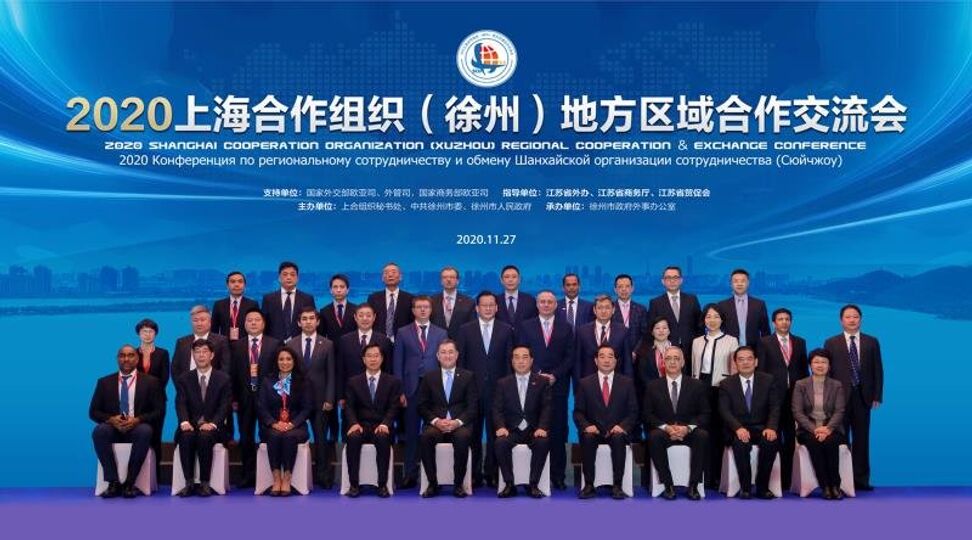The 2020 SCO Regional Cooperation and Exchange Conference took place on 27 November 2020 in Xuzhou, Jiangsu province, China.
Speakers at the conference included senior government officials from the Jiangsu province and from the city of Xuzhou, local business leaders and representatives of the diplomatic corps in China (Armenia, Azerbaijan, Belarus, Cambodia, Egypt, Kazakhstan, Kyrgyzstan, Mongolia, Nepal, Sri Lanka, Tajikistan, Thailand and Uzbekistan), trade missions, foreign and Chinese companies, as well as international organisations.
SCO Secretary-General Vladimir Norov sent a video message to the conference participants. In it, he talked about mutually beneficial trade, economic and investment ties between the SCO and Xuzhou, as well as promoting twin-city relations.
In this context, he emphasised that expanding ties within the SCO family was one of the key priorities for the organisation. The SCO is committed to strengthening cooperation by promoting region-to-region ties in numerous spheres of mutual interest.
Mr Norov said that he hoped the conference would make a meaningful contribution to building effective trade, economic, cultural and humanitarian cooperation mechanisms between Xuzhou and the SCO countries.
The event included the signing of a Memorandum of Cooperation between the Xuzhou Economic and Technological Development Zone and the SCO Business Council's Joint Business Cooperation Centre, as well as bilateral cooperation agreements between Xuzhou's and the SCO's educational institutions and businesses.
Participants were invited to visit XCMG, the world's largest heavy machinery manufacturing company, the Xuzhou Comprehensive Bonded Zone (includes a customs warehouse, an e-commerce centre and a demonstration zone), the Huaihai global port, as well as Han cultural heritage sites.
In his remarks, Deputy Chair of the Jiangsu Provincial People's Political Consultative Conference Wang Yong Ping shared some historical facts about the city of Xuzhou and its development since mid-20th century. He said that successful socioeconomic reforms made Xuzhou an important trade and manufacturing hub within the Jiangsu province. He went on to express interest in expanding ties with the SCO countries.
Secretary of the Xuzhou Communist Party committee Zhou Tiegen highlighted the city's main socioeconomic development initiatives, including in manufacturing, high technology, innovation, artificial intelligence, digitisation and cross-border e-commerce. He expressed hope that the conference will lay the groundwork for further strengthening region-to-region ties within the SCO.
In his presentation, Vice Mayor of Xuzhou People's Government Xu Donghai focused his attention on the city's competitive advantages in machine manufacturing, transport and logistics. In this context, he noted that the city has emerged as an advanced regional and national industrial centre for machine manufacturing, as well as a major transport hub. He noted that XCMG, the local heavy machine manufacturing company, is a world-leading manufacturer of high-tonnage all-terrain truck-mounted hydraulic cranes. Mr Xu Donghai also talked about plans to strengthen Xuzhou's role as a regional logistics and tourism centre, and called on the SCO countries to establish mutually beneficial business contacts.
Wang Hungliu, Director of General Affairs and Coordination Division of ASEAN-China Centre, informed the participants in the conference about economic development in ASEAN countries and the organisation's plans to promote sustainable economic development. She wished Xuzhou to become a "cooperation centre" between SCO countries and ASEAN.
The conference included presentations by representatives of diplomatic missions to China from Russia, Armenia, Azerbaijan, Kazakhstan, Kyrgyzstan, Sri-Lanka, Nepal and Mongolia. They said that their countries were committed to expanding and promoting business-to-business ties with Xuzhou's major companies and associations. They also called for stepping up trade, economic and investment cooperation with the city.
Overall, the participants agreed on the need to further promote region-to-region business ties and new contacts, as well as expand trade and economic cooperation at the bilateral level and across the SCO.
